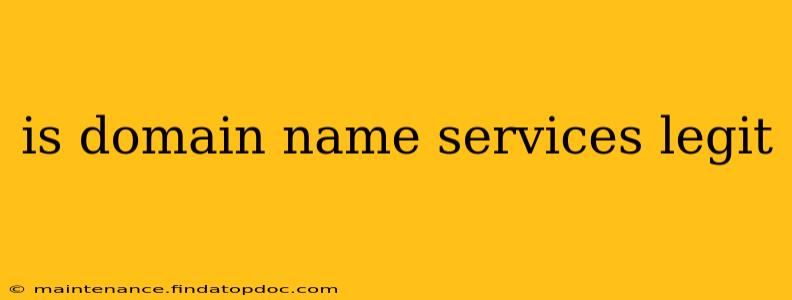The question, "Is domain name service (DNS) legitimate?" might seem odd at first. DNS is not a company or a service you subscribe to in the same way you do with Netflix or Spotify. Instead, it's the fundamental infrastructure that translates human-readable website addresses (like google.com) into machine-readable IP addresses (like 172.217.160.142). Think of it as the internet's phone book – it's essential for the internet to function, and its legitimacy is inherent to its role.
So, the answer is a resounding yes, DNS is completely legitimate and crucial for the internet's operation. However, the legitimacy of specific DNS providers is a different matter, and that's where potential concerns arise.
How Does DNS Work? A Simplified Explanation
Before delving into potential concerns, let's briefly examine how DNS works. When you type a website address into your browser, your computer queries a DNS server. This server looks up the corresponding IP address, which tells your computer where to find the website's data. This process happens in a hierarchical system, involving various types of DNS servers:
- Recursive resolvers: These are the servers your computer typically contacts first. They handle the entire lookup process for you.
- Root nameservers: These are at the top of the hierarchy and direct your request to the appropriate Top-Level Domain (TLD) nameservers (e.g.,
.com,.org,.net). - TLD nameservers: These servers manage the DNS records for a specific TLD.
- Authoritative nameservers: These are the servers that hold the actual DNS records for a particular domain name (like
example.com).
This complex system ensures that your request reaches its destination quickly and efficiently.
Are There Legitimate Concerns About DNS?
While DNS itself is legitimate, concerns arise when discussing specific DNS providers and their practices:
1. DNS Security:
- DNS spoofing/cache poisoning: Malicious actors can attempt to manipulate DNS responses to redirect users to fake websites (phishing). This is not a flaw in DNS itself, but a vulnerability that needs to be addressed with security measures like DNSSEC (DNS Security Extensions).
- DNS amplification attacks: These attacks exploit the DNS system to amplify the impact of a small attack into a large denial-of-service (DoS) attack. Again, this is not an inherent flaw in DNS but a security concern that requires mitigation strategies.
2. DNS Providers and Privacy:
- Data logging: Some DNS providers log your DNS queries, which can reveal the websites you visit. Choosing a privacy-focused DNS provider that doesn't log your data is crucial for protecting your online privacy. Many free and paid services offer privacy-centric solutions.
- DNS filtering: Some providers filter DNS queries, blocking access to certain websites. This can be used for parental control or by governments for censorship, raising concerns about net neutrality and freedom of speech.
3. Public vs. Private DNS
- Public DNS: These are publicly accessible DNS servers offered by companies like Google (Google Public DNS), Cloudflare (Cloudflare DNS), and OpenDNS. They often offer speed and security advantages over your ISP's DNS.
- Private DNS: This allows you to specify a DNS server of your choice directly in your operating system's network settings. This offers increased control and privacy.
Choosing a Reputable DNS Provider
Selecting a reputable DNS provider is vital. Look for providers with a strong reputation for security, privacy, and uptime. Consider factors like:
- Privacy policy: Does the provider log your DNS queries?
- Security features: Do they implement DNSSEC and other security measures?
- Performance: Are their servers fast and reliable?
- Reputation: What is the provider's track record?
In conclusion, DNS itself is a legitimate and integral part of the internet. However, choosing a trustworthy DNS provider is essential to ensure your security and privacy online. The legitimacy question should be directed towards the specific DNS service you're considering, not the DNS protocol as a whole.
